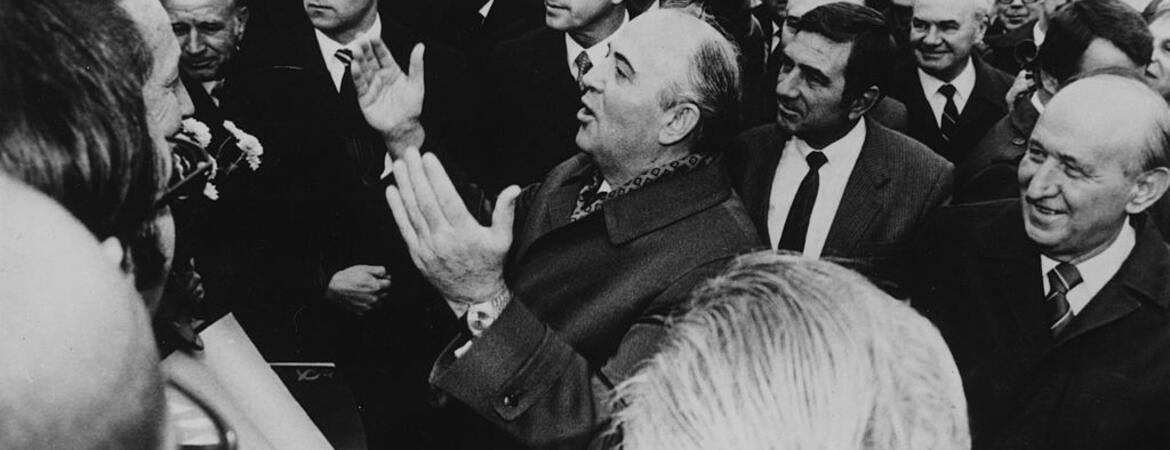
Mikhail Gorbachev is the man whose actions inserted the terms perestroika and glasnost into the international vernacular. In 1985, Mikhail Gorbachev became the leader of the Soviet Union, presiding over a remarkable five-year span during which until-then unimaginable democratic reforms were instituted, the Berlin Wall fell, communism was virtually wiped from Eastern Europe, and the Soviet Republic crumbled.
On the occasion of of Gorbachev's death at 91, we asked two UCR experts on Russian history, Paul D'Anieri and Kiril Tomoff, to weigh in on his legacy. D’Anieri, a professor of political science and public policy, is an expert on Eastern European and post-Soviet politics, and wrote a 2019 book titled “Ukraine and Russia.” For the 2017-18 academic year, he served as a fellow in the Harvard University Ukrainian Research Institution. Tomoff is a history professor and the associate dean of arts and humanities in the College of Humanities, Arts, and Social Sciences. His Ph.D. is in Russian and Soviet history, and his research interests include the Cold War. He is the author of two books on Soviet music and composers, a past director of the University of California's Moscow Study Center, and a senior fellow at the David Center for Russian and Eurasian Studies at Harvard University.
Q: Would the Mikhail Gorbachev who assumed power in 1985 have guessed he would end up liquidating the Soviet empire?
D'Anieri: No. Gorbachev never imagined that the Soviet Union would collapse, and he did everything he could to prevent it—except deploying the full repressive force of the Soviet state. When he promoted glasnost (openness) and democratization, he could not imagine that people outside of Russia would use the freedom to demand secession from the Soviet Union. But that is exactly what they did. While hard-liners insisted that he repress the independence movements, he sought instead to negotiate a new, looser, federation. That prompted the coup that eventually drove him from power.
Q: Gorbachev and Ronald Reagan’s five summits in time led to the elimination of many nuclear weapons with a range of 310-3,100 miles and what some considered an end to the Cold War. Was the relationship between the two men in any way remarkable?
Tomoff: What Gorbachev and Reagan negotiated - the relatively (not entirely) peaceful end to a global system of confrontation that had structured the international system for a half century - was one of the most extraordinary developments of the 20th century. So I think it would have been impossible for their relationship not to have been remarkable.
I also think it's clear that Reagan was the junior partner in that relationship. It was Gorbachev's vision of nuclear arms reduction and his commitment to withdrawing Soviet military support from the communist regimes of East-Central Europe that drove the relationship. It took awhile for Reagan to recognize the opportunity that Gorbachev was offering. To his great credit, he eventually did recognize it, even in the face of suspicion and outright opposition from his closest advisors. And from there, the significant reduction in nuclear arms and, ultimately, the end of the Cold War, followed.
Q: Can you frame in a larger historical context the months in 1989 when Eastern Europe’s Communist regimes fell?
Tomoff: I often tell my students that it's hard to convey the tremendous excitement that accompanied those months in 1989, as a European order, at least, that seemed so permanent at the beginning of the year fell so completely by year's end. And I ask them to imagine how the experience may have been for those living through it, not just observing it from the other side of the Cold War's divide. Even in retrospect, the rapidity of the change was staggering, even if the underlying causes and conditions that made it possible are no longer so surprising.
Remember that Gorbachev's main priority was perestroika, economic reconstruction. To focus on that priority, he also calculated that the Soviet Union needed to reduce its commitments abroad. That calculation led to three major policy shifts: The commitment to arms control and drastic cuts in nuclear arsenals and their deployments that we just discussed; the withdrawal of support from revolutionary movements and pro-Soviet regimes in the developing world; and the revocation of the Brezhnev Doctrine that served as the justification for Soviet intervention in defense of state-socialist regimes in Eastern Europe. Repudiation of the Brezhnev Doctrine allowed reform movements to blossom across Eastern Europe, which transformed into really massive popular demonstrations in the summer of 1989. Reform ultimately culminated in the rapid disintegration of those regimes in the late summer and fall. The sudden, unannounced opening of the Berlin Wall one night in November 1989 came to symbolize the comparatively peaceful end of the Soviet Union's extraterritorial empire and, at the end of the day, of the Cold War itself.
Q: The 500 Days program was the embodiment of perestroika; a transition to a market economy. But Gorbachev ultimately abandoned it. Should he have stuck to it? Could he have?
Tomoff: The 500 Days program was an economic reform package proposed by a group of economists empowered by Gorbachev in late 1990 to develop a rapid shift to a market economy from the command economy that Gorbachev's earlier reforms had essentially dismantled, causing a deep economic crisis. It provides a good illustration of both how Gorbachev sought, ultimately unsuccessfully, to manage fundamental reform of the Soviet system and how that process ultimately escaped his control.
Gorbachev came to power as a reformer who was also extremely adept at building coalitions within the Communist Party leadership. His first priority was to remake an economy that had so stagnated during the preceding decade that Soviet life expectancy was actually declining, and the Soviet standard of living fell far below that sustained by the developed economies of what the Soviets called "the capitalist world." Policies designed to reconstruct the economy were famously labeled, "perestroika." To support perestroika, Gorbachev thought the Soviet Union needed a more engaged, participatory citizenry. In search of that citizenry and to maintain support against party hardliners, Gorbachev decided he needed to embrace political reform - glasnost' ("openness"), as well. It was really glasnost that unleashed the forces that ultimately spun out of Gorbachev's control, prompting him to authorize bloody crackdowns on national independence movements in Kazakhstan, the Baltic Republics, and the Caucasus. But the half measures of early perestroika also debilitated the old, inefficient economy without stimulating a successful replacement system.
That's the context in which I think it's helpful to think about the development and ultimate rejection of the 500 Days program. It was the 1990 version of rapid and radical economic reform, embraced by the most committed reformers (like Boris Yeltsin) and bitterly opposed by party conservatives. It also called for a major shift in the relative power of regional elites and central elites and institutions based in Moscow. Part of the irony of Gorbachev's political maneuvers throughout the late 1980s was that he sought to reduce the relative power of the Party and central, Soviet Union-level institutions in order to promote reform, but his power was derived from his leadership of precisely those central institutions. That dynamic ultimately proved impossible for him to maintain. The 500 Days program envisioned a de-centralization of decision-making authority that went too far, even for Gorbachev, which was one of the reasons that he rejected it. Instead, he continued to try to chart a more cautious, middle approach, and the compromise economic reform proposal that almost immediately replaced the 500 Days program was such an effort.
Whether or not he should or could have stuck to it is a tricky question. I don't think he could have and maintained his coalition building, but that ultimately failed anyway. Should he have? I don't know. Boris Yeltsin remained committed to it and made it the initial basis of his economic reform effort in immediate post-Soviet Russia. The early 1990s were disastrous for most Russians, and the widespread misery of those years went a long way toward discrediting the formerly exciting notions of "democracy" and "freedom" with which it came to be associated in the eyes of many Russians. Judging from that experience, perhaps the more gradual, compromise approach would have been better. So much had changed by the end of 1991, though, that I think it's impossible to project backward even a year.
Q: Gorbachev himself later reflected on his 1991 downfall saying he should have formed a new political party, and to more gently release the Soviet republics. Where – if anywhere – did he go wrong?
D'Anieri: It is hard to know how Gorbachev could have controlled the forces he set in motion. Given the opportunity to speak out and to vote, the Soviet people were going to reject the Communist party. Gorbachev later said that he wished he had resigned from the party in early 1991 and started a democratic party, rather than trying to compromise with hard-liners. The common mistake that both Gorbachev and Yeltsin made was being too timid in economic reform. The mix of state planning and market was disastrous. However, the Soviet economy was already in serious trouble at this point, and any attempt to reform it was going to lead to a period of extreme hardship. That came to be blamed on Gorbachev and Yeltsin, but it really was the fault of their predecessors, and in many respects was inherent in the Soviet system of state planning.
Tomoff: I think answering that question depends largely on one's perspective about the ultimate outcome of the Gorbachev years. I don't hear much criticism of Gorbachev's foreign policy, the de-escalation of the Cold War, initiation of nuclear arms control treaties, and the results of 1989. Those stand as positive legacies.
But the negative legacies are just as clear: The fact that he undermined glasnost - by, for example, initially attempting to conceal the Chernobyl disaster in 1986 is one. Using force to crack down on independence movements in the national republics, is another. But at least in the immediate aftermath of the Gorbachev years, his biggest failure was facilitating the collapse of the Soviet Union itself. Certainly, overseeing the disintegration of the state one leads cannot be counted a success. But of course, by the end, populations in several national republics clearly wanted no longer to be part of the Soviet Union and, in the most surprising development at the time, even the Russian core of the multinational state followed Boris Yeltsin as he led a coalition of other republics' leaders to dissolve it.
Still, I don't think there's much doubt that the destruction of the economic networks and interconnections of the Soviet economy and the violent, chaotic privatization of Soviet assets in the early 1990s caused a sudden and significant decline in the health and well-being of the formerly Soviet population. Most probably would have preferred, I think, a "more gentle" end. But considering the stark polarization between conservatives seeking to overturn all of Gorbachev's reforms and the radical reformers who thought he was simply moving too slowly, there was not, by the end, any constituency or institutional power base left to support his middle path. Whether he should have, therefore, moved more quickly in the late 1980s, not started the political reforms of glasnost' at all (the path to reform an observant Chinese leadership would follow), or done what he did - open the possibility of reform, democracy, and a market economy and then (unwillingly, it must be said) step out of the way, depends on what outcome we would have preferred.
As it happened, I think there's little doubt both that Gorbachev was one of the most consequential figures of the last century, and the one with the most complex and contradictory legacy. For many, he opened up possibilities of tolerance and peaceful self-determination. It is perhaps fitting that he has died at a moment when those possibilities are being foreclosed again by the regime that ultimately inherited the Russian core of the Soviet Union he tried so hard, if unsuccessfully, to reform.
Q: Do we have any idea how Gorbachev regarded the Putin regime, prior to the war in Ukraine? After the invasion?
D'Anieri: Gorbachev's views seemed to mirror those of many Russians. Initially, he welcomed Putin’s ability to bring order to Russia after the chaos of the Yeltsin years. Later, however, he became critical of Putin’s increasing authoritarianism.
Q: What persists from Gorbachev’s legacy?
D'Anieri: Mikhail Gorbachev was arguably the most important world leader since World War II. The clarity with which he saw the flaws in Soviet communism and the bravery with which he tackled them are not diminished by the fact that his reforms ultimately failed in Russia. He mastered the Soviet system well enough to rise to the top of it, and then dismantled it, leading to his ouster from power. Gorbachev almost single-handedly ended the Cold War and in the process brought freedom to over a dozen countries and hundreds of millions of people.
As bad as things are today between the West and Russia, they are not as bad as during the Cold War. The countries of Eastern Europe are democratic and prosperous because Gorbachev made it clear that the Soviet Union would no longer use force to keep their communist regimes in power. In many respects, Vladimir Putin’s presidency has been devoted to undoing everything Gorbachev did. While Gorbachev is regarded with contempt in Russia today, Russia’s resurgence would be impossible without the changes that he set in motion over 30 years ago.
Tomoff: Twentieth century decolonization was almost always a violent process, and typically a very violent one. That Gorbachev managed to oversee the end of the Soviet Union's empire in East-Central Europe with extremely little bloodshed (the end of the Ceaușescu regime in Romania was the main exception), extending national sovereignty and at least the possibility of democratic governance to millions of people, I think, remains Gorbachev's most unequivocally positive legacy.





